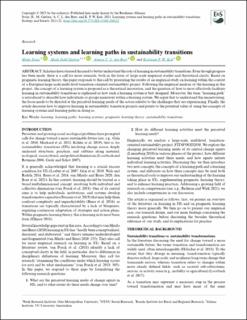Learning systems and learning paths in sustainability transitions
Peer reviewed, Journal article
Published version
Permanent lenke
https://hdl.handle.net/11250/3114961Utgivelsesdato
2023Metadata
Vis full innførselSamlinger
- AFI Notat [42]
- Publikasjoner fra Cristin [3196]
- SVA - joint [15]
Originalversjon
10.5751/ES-13868-280122Sammendrag
Scholars have stressed the need to better understand the role of learning in sustainability transitions. Even though progress has been made, there is a call for more research, both in the form of large-scale empirical studies and theoretical clarity. Based on pragmatic learning theory, this paper responds to this call by presenting the results of an empirical study on learning within the context of a European large-scale multi-level transition-oriented sustainability project. Following the empirical analysis of the learning in this project, the concept of a learning system is proposed as a theoretical innovation, and the question of how to most effectively facilitate learning in sustainability transitions is rephrased as how such a learning system is best designed. Moreover, the term “learning path” is introduced to describe how individuals or groups maneuver within a learning system. We argue that to understand this maneuvering, the focus needs to be directed at the perceived learning needs of the actors relative to the challenges they are experiencing. Finally, the article discusses how to improve learning in sustainability transition projects and points to the potential value of using the concepts of learning systems and learning paths in doing so.

